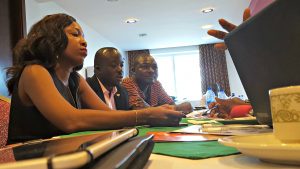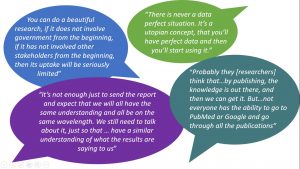Seven ways to support organizational change for evidence use
How can we support organizational change in the way evidence is used in policy? Contextual understanding, locally led approaches and flexibility are required, writes Clara Richards
How can we support organizational change in the way evidence is used in policy? Contextual understanding, locally led approaches and flexibility are required, writes Clara Richards
In this new evidence spotlight blog Hannah Katwaroo, Research Specialist, discusses how INASP and Trinidad & Tobago’s Ministry of Education met and exchanged knowledge use ideas
Recently, INASP held a webinar to explore how peer learning can support evidence use in parliament. This webinar was hosted in collaboration with African Center for Parliamentary Affairs (ACEPA) and AGORA as part of the extension of our parliamentary peer learning project supported by a SPARKS grant from the Effective Institutions Platform. Our partner parliaments in Kenya, Uganda and Ghana shared their experience of how staff and Members of Parliament (MPs) can work together to drive an evidence-informed approach within parliament. Here, we discuss how peer learning can strengthen evidence use in parliaments, sharing some of the insights gained during the webinar discussions.
Evidence plays a critical role in designing and implementing the most effective and efficient HIV prevention policies and programmes and saving lives. But in HIV prevention policy, the topic of evidence involves many points of debate, from what constitutes ‘good’ evidence to how to negotiate the intersection between health and rights. So how can researchers effectively contribute to the policy-making process in such a controversial area?
As we celebrate our 25th anniversary, we’ve been reflecting on INASP’s core pillars – the approaches that are most important in our work to put research and knowledge at the heart of development. INASP’s core pillars are central to our identity as a catalyst for change. How do they play out in practice? And what makes these approaches unique? Our staff reflect.
Interview with Marale Sande, Senior Research and Policy Analyst with the Parliamentary Research Services at the Parliament of Kenya. Marale works collaboratively with Members of Parliament (MPs) as part of the Evidence Informed Policy Caucus, an informal committee of the House that aims to increase the awareness and uptake of evidence. In this interview, Marale outlines her experience with championing evidence within a parliamentary setting.
Registered charity no: 1106349
The Old Music Hall, 106-108 Cowley Road,
Oxford, OX4 1JE, UK
Tel: +44 (0)1865 249909
Email: info@inasp.info
© copyright 2024





